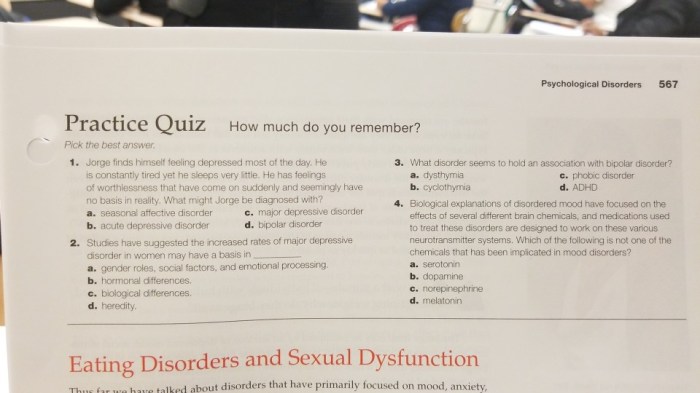Psychological disorders webquest answer key – Embark on an enlightening journey into the realm of psychological disorders with our comprehensive answer key. This resource delves into the intricacies of mental health, providing a thorough understanding of its causes, diagnosis, treatment, and management.
Delve into the depths of psychological disorders, unraveling their complex nature and gaining invaluable insights into the challenges and triumphs of mental health.
Overview of Psychological Disorders
Psychological disorders, also known as mental disorders, are conditions that affect a person’s thinking, feeling, and behavior. They can cause significant distress and impairment in daily life.
The Diagnostic and Statistical Manual of Mental Disorders (DSM-5) is the primary diagnostic tool used by mental health professionals to diagnose psychological disorders. The DSM-5 provides criteria for diagnosing specific disorders, including symptoms, duration, and severity.
Types of Psychological Disorders
- Anxiety disorders: These disorders are characterized by excessive fear or anxiety. Examples include generalized anxiety disorder, panic disorder, and phobias.
- Mood disorders: These disorders are characterized by disturbances in mood, such as depression or mania. Examples include major depressive disorder and bipolar disorder.
- Psychotic disorders: These disorders are characterized by a loss of contact with reality. Examples include schizophrenia and schizoaffective disorder.
- Personality disorders: These disorders are characterized by inflexible and maladaptive personality traits. Examples include borderline personality disorder and antisocial personality disorder.
- Eating disorders: These disorders are characterized by disturbances in eating behavior. Examples include anorexia nervosa and bulimia nervosa.
- Substance use disorders: These disorders are characterized by the compulsive use of substances, such as alcohol or drugs. Examples include alcohol use disorder and drug use disorder.
Causes of Psychological Disorders
The causes of psychological disorders are complex and can vary depending on the specific disorder. However, research has identified several factors that can contribute to the development of psychological disorders, including:
Biological Factors
- Genetics: Studies have shown that some psychological disorders, such as schizophrenia and bipolar disorder, have a genetic component.
- Brain chemistry: Imbalances in neurotransmitters, such as serotonin and dopamine, can contribute to the development of psychological disorders.
- Physical health conditions: Certain physical health conditions, such as thyroid problems or brain tumors, can cause psychological symptoms.
Psychological Factors, Psychological disorders webquest answer key
- Trauma: Experiencing traumatic events, such as abuse or neglect, can increase the risk of developing psychological disorders.
- Stress: Chronic stress can lead to the development of psychological disorders, such as anxiety or depression.
- Cognitive distortions: Negative or distorted thinking patterns can contribute to the development of psychological disorders.
Social Factors
- Social isolation: Lack of social support can increase the risk of developing psychological disorders.
- Poverty: Poverty and other social stressors can contribute to the development of psychological disorders.
- Cultural factors: Cultural beliefs and values can influence the way that psychological disorders are perceived and treated.
Diagnosis and Assessment of Psychological Disorders

Diagnosing and assessing psychological disorders is a complex process that involves gathering information from a variety of sources, including the individual, their family, and their medical records.
The most common methods used to diagnose and assess psychological disorders include:
Clinical Interviews
- Structured interviews: These interviews use a standardized set of questions to assess for specific symptoms and disorders.
- Unstructured interviews: These interviews are more flexible and allow the clinician to explore the individual’s concerns in more depth.
Psychological Tests
- Personality tests: These tests assess for personality traits and disorders.
- Intelligence tests: These tests assess for intellectual functioning.
- Neuropsychological tests: These tests assess for cognitive functioning.
Medical Evaluations
- Physical examinations: These examinations can rule out any underlying medical conditions that may be contributing to the psychological symptoms.
- Blood tests: These tests can check for any medical conditions that may be causing the psychological symptoms.
- Imaging studies: These studies, such as MRI or CT scans, can be used to rule out any structural abnormalities in the brain.
Treatment of Psychological Disorders: Psychological Disorders Webquest Answer Key
The treatment of psychological disorders depends on the specific disorder and the individual’s needs. However, there are several common treatment approaches that are used, including:
Psychotherapy
- Cognitive-behavioral therapy (CBT): CBT focuses on changing negative thoughts and behaviors that contribute to psychological disorders.
- Psychodynamic therapy: Psychodynamic therapy explores the unconscious mind and early childhood experiences to help individuals understand and resolve their psychological problems.
- Humanistic therapy: Humanistic therapy focuses on helping individuals achieve their full potential and live meaningful lives.
Medication
- Antidepressants: These medications are used to treat depression and other mood disorders.
- Antipsychotics: These medications are used to treat psychotic disorders, such as schizophrenia.
- Anxiolytics: These medications are used to treat anxiety disorders.
Lifestyle Changes
- Exercise: Exercise can help to improve mood and reduce stress.
- Healthy diet: Eating a healthy diet can help to improve overall health and well-being.
- Sleep hygiene: Getting enough sleep is essential for mental health.
Prevention and Management of Psychological Disorders
Preventing and managing psychological disorders is important for maintaining mental health and well-being. There are several strategies that can be used to prevent and manage psychological disorders, including:
Prevention
- Early intervention: Identifying and treating psychological problems early on can help to prevent them from becoming more severe.
- Education: Educating people about mental health and psychological disorders can help to reduce stigma and promote early intervention.
- Community support: Building strong community support systems can help to reduce stress and provide support for individuals who are struggling with mental health problems.
Management
- Self-help strategies: There are a number of self-help strategies that can be used to manage psychological disorders, such as exercise, meditation, and mindfulness.
- Support groups: Support groups can provide a safe and supportive environment for individuals to share their experiences and learn from others who are struggling with similar issues.
- Professional help: If self-help strategies and support groups are not enough to manage a psychological disorder, it is important to seek professional help.
Ethical Considerations in the Treatment of Psychological Disorders

The treatment of psychological disorders raises a number of ethical considerations, including:
Informed Consent
- Individuals should be fully informed about the risks and benefits of treatment before they consent to it.
- Individuals should be able to make informed decisions about their treatment.
Confidentiality
- The information that individuals share with their therapists should be kept confidential.
- Therapists should only release information about their clients with their consent.
Cultural Sensitivity
- Therapists should be aware of the cultural factors that can influence the presentation and treatment of psychological disorders.
- Therapists should be respectful of the cultural beliefs and values of their clients.
Question & Answer Hub
What are the common types of psychological disorders?
Anxiety disorders, mood disorders, personality disorders, psychotic disorders, and eating disorders are among the most prevalent types.
How are psychological disorders diagnosed?
Diagnosis involves a comprehensive assessment by mental health professionals using clinical interviews, psychological tests, and medical evaluations.
What are the treatment options for psychological disorders?
Treatment approaches include psychotherapy, medication, lifestyle changes, and a combination of these.